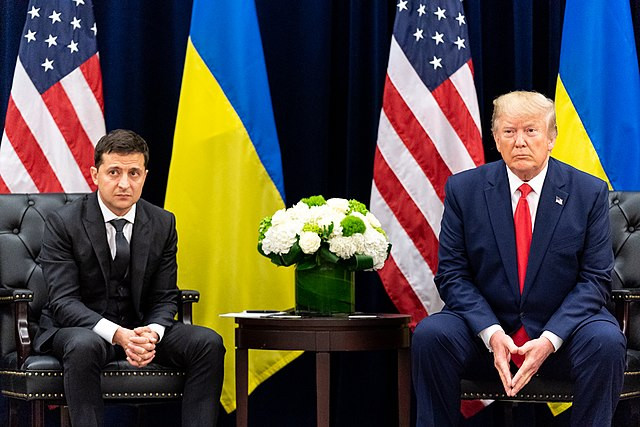President Donald Trump on Wednesday warned Ukrainian President Volodymyr Zelenskyy to swiftly negotiate an end to Russia's invasion or risk losing his country altogether. In a post on Truth Social, Trump accused Zelenskyy of leading a war that "couldn't be won" and labeled him "a dictator without elections," escalating an already tense exchange between the two leaders.
"Zelenskyy better move fast or he is not going to have a Country left," Trump wrote. "In the meantime, we are successfully negotiating an end to the War with Russia, something all admit only 'TRUMP,' and the Trump Administration, can do. Biden never tried, Europe has failed to bring Peace, and Zelenskyy probably wants to keep the 'gravy train' going."
Trump's remarks come amid growing concerns in Kyiv and European capitals over his administration's approach to the war. His statements follow an earlier claim that Ukraine was responsible for starting the conflict-an assertion widely refuted, as Russia invaded Ukraine in February 2022. Senate Majority Leader Chuck Schumer, D-N.Y., called Trump's rhetoric "disgusting," saying, "It's disgusting to see an American president turn against one of our friends and openly side with a thug like Vladimir Putin."
Zelenskyy, speaking in Kyiv on Wednesday, rejected Trump's characterizations and accused him of repeating Russian disinformation. "We have seen this disinformation. We understand that it is coming from Russia," he said, pointing to Trump's claim that the Ukrainian leader has only 4% approval in his country. A new poll from the Kyiv International Institute of Sociology shows that 57% of Ukrainians trust Zelenskyy, contradicting Trump's statement.
The sharp exchange between the leaders comes as the Trump administration pursues negotiations with Russia to end the war. On Tuesday, Secretary of State Marco Rubio and Russian Foreign Minister Sergey Lavrov held talks in Saudi Arabia without Ukrainian or European officials present. Ukrainian officials have expressed frustration over being excluded from discussions that could determine their country's future. "Why should dominance be handed over to a country that is an aggressor, a violator of international law, and the author of aggression against Ukraine?" said Mykhailo Podolyak, an adviser to Zelenskyy. "We still do not understand this strategy."
Vice President JD Vance defended Trump's stance, saying Zelenskyy's criticisms were counterproductive. "The idea that Zelensky is going to change the president's mind by bad-mouthing him in public media-everyone who knows the president will tell you that is an atrocious way to deal with this administration," Vance said.
The Trump administration has also expressed frustration with Ukraine over a proposed agreement that would grant the U.S. access to Ukraine's rare earth minerals. Zelenskyy reportedly instructed his ministers not to sign off on the deal, arguing it was too one-sided in favor of the U.S. The dispute has further strained relations between Washington and Kyiv, as Trump officials view the agreement as a crucial economic and strategic asset.
Republican lawmakers offered mixed reactions to Trump's comments. Sen. John Kennedy, R-La., pushed back against Trump's claim that Ukraine was responsible for the war, saying, "I think Vladimir Putin started the war. I also believe, from bitter experience, that Vladimir Putin is a gangster. He's a gangster with a black heart." Sen. Susan Collins, R-Maine, said simply, "I don't agree" when asked about Trump's remarks.
Trump's rhetoric aligns closely with Moscow's narrative about the war. Lavrov, speaking before Russian lawmakers Wednesday, said Trump is "the first, and so far, apparently, the only Western leader who has publicly and loudly said that one of the root causes of the Ukrainian situation was the brazen path of the previous administration to draw Ukraine into NATO." Lavrov described Trump's statements as "a signal that he understands our position."
The heated exchange comes at a pivotal moment for Ukraine, which continues to rely on Western military aid to counter Russia's offensive. U.S. support, which has totaled approximately $183 billion since the war began, remains a politically charged issue, particularly as Trump signals a shift in approach. Zelenskyy reiterated that any peace settlement must involve Ukraine directly and vowed not to accept a deal negotiated behind his country's back.





